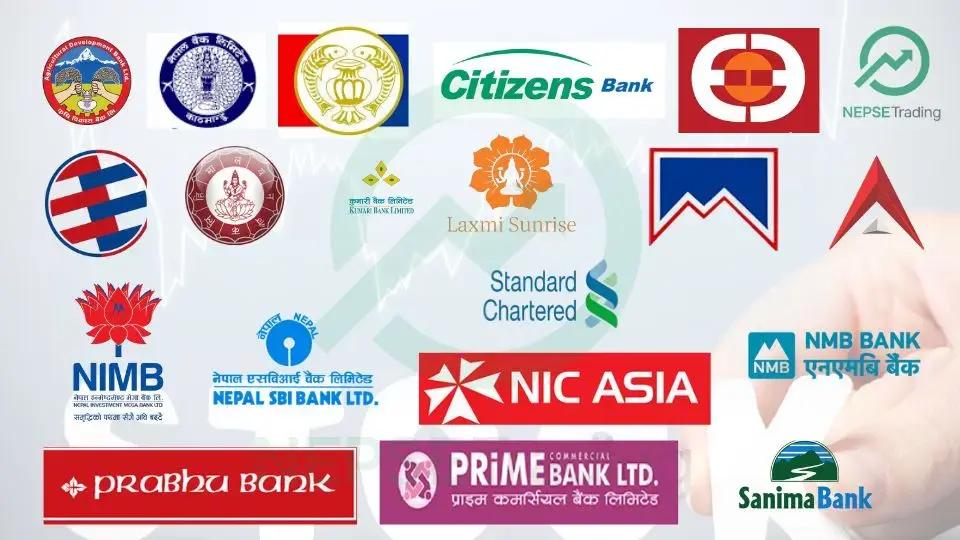Bank Interest Rates Decline Again in Mangsir, Half of the Banks Cut Fixed Deposit Rates
Author
NEPSE trading

Commercial banks have further reduced their fixed deposit interest rates for the month of Mangsir, continuing a downward trend that has persisted for several months. According to the new rate sheets published by the banks, 10 out of 20 banks have lowered their interest rates, while the remaining 10 banks have kept the Kartik rates unchanged.
Average Interest Rates Fall: 5.20% in Kartik → 5.04% in Mangsir
The average fixed deposit interest rate for individual depositors has dropped to 5.04% for Mangsir.
This is 0.16 percentage points lower than Kartik’s average rate of 5.20%.
Similarly, the institutional fixed deposit rate has also decreased by 0.07 percentage points during the review period. This marks another month of easing interest rates across the banking sector.
10 Banks Cut Rates, 10 Banks Keep Rates Stable
Banks that reduced individual fixed deposit rates in Mangsir include:
NIC Asia Bank
Siddhartha Bank
Himalayan Bank
Standard Chartered Bank
Prime Commercial Bank
Citizen Bank
Nabil Bank
Nepal SBI Bank
Sanima Bank
Kumari Bank
Meanwhile, the other 10 banks — including Global IME Bank, Nepal Bank, Rastriya Banijya Bank, Agriculture Development Bank, NIMB, Prabhu Bank and others — have kept Kartik’s interest rates unchanged.
Highest and Lowest Interest Rates in the Market
Highest rate for individual fixed deposits:
Global IME Bank – 6%Lowest rate for individual fixed deposits:
Standard Chartered Bank – 4.7%
Global IME continues to offer the most competitive fixed deposit rate, while Standard Chartered remains the most conservative.
NIC Asia Records the Largest Rate Cut
Among all banks, NIC Asia Bank made the biggest rate cut this month.
The bank reduced its individual fixed deposit rate by a significant 0.75 percentage points compared to Kartik.
NIC Asia will now offer a maximum of 5.75% on individual fixed deposits in Mangsir.
It has also reduced institutional fixed deposit rates.
Why Are Interest Rates Falling?
Several structural and macroeconomic factors explain the ongoing decline in bank interest rates:
1. Excess Liquidity in Banks
Banks and financial institutions are sitting on large volumes of unutilized funds.
Lending activity remains sluggish, resulting in a surplus of investable resources.
2. Weak Credit Demand
Following recent political and economic uncertainties — particularly after the Gen-Z movement — business confidence has dropped.
Investment appetite has weakened, and new loan demand has almost stalled.
3. NRB’s Tight Liquidity Management Tools
Nepal Rastra Bank has been actively absorbing liquidity through:
Deposit collection instruments
Standing Deposit Facility (SDF)
Long-term liquidity absorption tools
Current policy rates include:
Policy Rate: 4.5%
Standing Liquidity Facility (SLF): 6%
Standing Deposit Facility (SDF): 2.75%
These rates indirectly guide banks to keep deposit rates low.
Most banks are offering lower rates for short-term deposits.
However, they continue to provide slightly higher rates for long-term deposits (above 5 years) to attract stability-seeking depositors.
Bank interest rates have slipped further in Mangsir, reducing returns for fixed deposit holders.
While lower deposit rates are gradually pulling lending rates down as well, credit demand remains extremely weak.
Despite having ample liquidity, banks are unable to expand lending due to low business confidence and limited economic activity.
With half of the banks cutting rates and the rest keeping them unchanged, the overall trend indicates that interest rates are likely to remain under pressure unless credit demand revives or liquidity conditions tighten.


